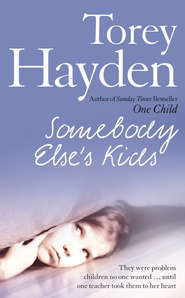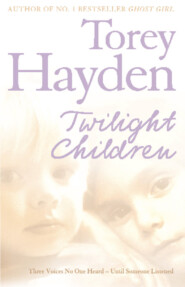По всем вопросам обращайтесь на: info@litportal.ru
(©) 2003-2024.
✖
The Tiger’s Child and Somebody Else’s Kids 2-in-1 Collection
Настройки чтения
Размер шрифта
Высота строк
Поля
I simply couldn’t let it happen without a fight. When she had arrived in January, she had presented as bleak a case as I had ever encountered, and if they’d come for her then, I might have accepted it. But now …? The very thought of a child of Sheila’s caliber ending up institutionalized at six froze me to my soul.
That evening when I was home, ostensibly watching television with my boyfriend, Chad, a plan formed in my mind. I had so much evidence of both Sheila’s intelligence and her progress that I wondered if there might be a chance of changing things. It would have to be approached in a formal, unequivocal manner to be taken seriously and it would have to be undertaken rapidly. I glanced over at Chad. He was a very new junior partner in a law firm downtown and was spending much of his time as a court-appointed lawyer to those who couldn’t afford their own legal advice. So he knew the ropes.
“Is there a legal way to contest what they want to do with Sheila?” I asked cautiously.
“You fight it?” he replied, sensing the meaning under my words.
“Someone has to. I’m quite sure the school district would support me. The school psychologist has been in to administer IQ tests. He had evidence of her giftedness. And Ed knows.”
A pause. A few mutterings. I was the sort of person inclined, as Chad described it, “to get the bit between my teeth and run,” so I think he could guess the obsessive nature of what was going to happen.
“Would you take it on for me?” I asked.
“Me?”
Yeah, him.
And so it was. With admirable solidarity, the school district did back me fully. They even paid for Chad’s services. I marshaled together the videotapes I’d made of Sheila in class, her schoolwork, the psychologist’s evaluations and whatever other examples I could find to support Sheila’s steady improvement. The weakest link in the chain was Sheila’s father, who had been in and out of so many institutions himself that he didn’t seem to believe there was any point to pursuing a different life for his daughter. He was deeply suspicious of us because we did. Beneath his boorish behavior, I felt he did genuinely love Sheila, but it took several rather beery evenings between us to convince him we were right.
The hearing was held on the very last day of March, a dark, windy day that promised to bend the daffodils down yet again with snow. Sheila had had to come along, still dressed in her T-shirt and now badly outgrown overalls. They were clean and I had managed to get her father to accept socks and mittens for her from our church donation box, but that was the best I could do. She sat outside the courtroom with an attendant, in case we needed to call her in.
Inside, I saw the parents of the little boy whom Sheila had abducted and set alight. It was the first time I’d encountered them. Up to that moment, the incident that had placed her in my class had seemed distant to me. In truth, I suppose I had kept it distant in my mind in an effort to make such an act of calculated cruelty unreal. Sheila certainly had done some outrageous things and she had done plenty of them in my presence, so I’d always felt I had a realistic picture of her, but for the first time I had to confront the veracity of another point of view. This upset me, if for no other reason than that I had so desperately wanted to feel a hundred percent right in what I was doing just then. In a way I still did. Revenge would not undo the harm done to their son and it would cripple Sheila for life. This was the only right route for this girl. Yet the hearing brought home to me the enormity of what she had done.
The judge ruled in Sheila’s favor. She was to remain under Social Services supervision, but the order for detainment in the children’s unit was rescinded. Joy broke out in the halls of the courthouse, and afterward, Chad and I took Sheila out to celebrate.
It was a magical evening, one of those times when the experience is greater than the sum of its parts. Still high from our success, we went for pizza in a place Chad and I haunted frequently, full of smoke and jazz music and people speaking Italian. Sheila had never had pizza and took to the new experience with animated delight. Indeed, she took to Chad, and he, likewise, to her. He was soon as much under her spell as I was.
They got into a silly contest, the two of them. What would you like best? To eat a worm sundae or brush your teeth with a spider toothbrush? That sort of thing. Until Chad went serious and asked what was the thing she would like best in all the world—for real. A dress, as it turned out. Something pretty to wear. Unable to resist this opportunity to play Santa Claus, Chad soon had us out to the shopping center. Despite all Sheila’s fears that her father wouldn’t let her accept a dress, Chad reassured her and helped her find the one she liked best.
Sheila fell asleep on the way back to her house in the migrant camp.
“Well, Cinderella,” Chad said, coming around to my side of the car and opening the door. He reached down and lifted her up. “The ball’s over.”
She smiled sleepily at him.
“Come on. I’ll carry you in and tell your daddy what we’ve been up to.”
She buried her face in my hair. “I don’t wanna go,” she whispered.
“It’s been a nice night, hasn’t it?” I said.
She nodded and she pressed tighter against me. “Can I kiss you?”
“Yes, I think so,” I said and enveloped her in a tight hug and kissed her first.
Chapter 4 (#ulink_378b6601-def2-5ae0-b601-020cb2fd5eac)
My class would cease to exist at the end of that school year. The mainstreaming law with its edict that every handicapped child should be placed in the least restrictive alternative was the primary cause. Most of the special education classes were being closed and teachers like myself were being redeployed as “resource people” to provide support to the regular classroom teachers, who would now have special education children among their students.
I wasn’t terribly comfortable with this change. While I would have liked to accept the law on the ideological grounds it was being put forth on—that it would promote greater equality and opportunity for handicapped children—I was too much of a natural cynic. The far more obvious factor to me was that it was a cheaper way to educate handicapped children.
On a personal level, my style of teaching was best suited to the closed environment of a self-contained classroom. It was in this setting I was at my best. I could create the tight-knit, supportive milieu that became my trademark and it was under these circumstances I could encourage the most positive growth among my students. Consequently, I was loath to become a floating resource person with my children reduced to a catalog of educational problems I was given twenty minutes a week to sort out. Most difficult, however, was being boxed in theoretically. I was an eclectic, picking and choosing my methods of operation from a wide variety of sources, some of them entirely outside education. This seemed the only sensible approach when dealing with such varied difficulties as one comes across in human behavior. However, with the new law we were going to be restricted, generally to some form of behavior modification. I was competent enough with this approach but felt it vastly overrated as a method and rather dangerous as a theory. Thus, not feeling that I was ready to commit myself to all of this, I applied and was accepted at an out-of-state university to do further graduate work.
It was May and school would end the first week in June. In the four and a half months Sheila had been with us, she had metamorphosed into a lively, sunny-natured girl. We had had no serious breaches of behavior since that week in February when I had gone to the conference, and while she was still capable of a hearty tantrum when provoked, normal methods of discipline brought her back into line. She could now express anger without destructiveness; she could be reasoned with; and she could even accept a small amount of gentle criticism without falling to pieces. In short, I didn’t feel Sheila would need a special class any longer. She was still fragile and the placement would need to be well thought out, but I was convinced she had the capacity to get on in a normal classroom.
I had a good friend, Sandy McGuire, a third-grade teacher in another school who I felt would be an ideal next teacher for Sheila. She was young, innovative and had a reputation for sensitivity toward her students, many of whom came from minority backgrounds or extreme poverty. And while we had quite different styles of teaching, we shared similar philosophies. I felt confident that if Sheila went with her, she would receive the support and encouragement she would need to make the transition back into the mainstream.
In the beginning, Ed, the director of special education, was not in favor of this, as it would mean not only releasing Sheila back into regular education, but also advancing her a grade, a practice he frowned upon; however, after much discussion we mutually concluded this was the best choice. Academically, Sheila was at least two grades above her chronological peers and she had no current peer friendships to disrupt anyway. Moreover, I feared that if Sheila did not receive a certain amount of academic challenge, she would get herself into trouble just to stay occupied. The most important factor, however, remained the teacher. Sheila had to have a flexible, supportive teacher to cope with the transition from me and my room to a new setting and I held tight to my belief that Sandy best fulfilled this capacity. In the end, Ed and the placement team agreed.
Sheila didn’t.
I approached the whole issue cautiously, although not tentatively, as Sheila would home in on anything done with uncertainty. Moreover, there was nothing to be tentative about. June was coming and that was the end.
Tears, anger and great silences met my early efforts to broach the subject. We spent the better half of a week dancing nervously around the matter, once it had been raised.
“This here be my class,” Sheila muttered to me after school. Her peculiar usage of the word “be” had almost disappeared over the months since she had been in our room, but now it came back. “I ain’t going in no other class. This here be mine.”
“Yes, it is, but the school year will be over in a few weeks’ time. We need to think about next year.”
“I’m gonna be in here next year.”
My heart sank. “No, sweetie.”
“I am too!” she shouted. “I’ll be the baddest kid in the whole world. Then they won’t let you make me go away!”
“Oh, Sheil. Oh, sweetheart, that’s not what’s happening. I’m not kicking you out. I’d love to have you with me.”
She remained angry, her face flushed, her eyes hurt. She pressed her hands over her ears.
“This class isn’t going to be here next year,” I said softly.
She heard me, even through her hands. The color drained from her face. “What d’you mean? Where’s it going?”
“It’s a grown-up decision. The school district decided they don’t need it and everyone can go into other classes.”
Tears filled her eyes. Taking out the chair across the table from me, she slumped into it, folded her arms on the table and lay her head on it. The tears just fell. Her pain was palpable. I’m sure I could have touched it, had I reached out, and when I didn’t, it pressed in against me.
All I could think of at just that moment was how much we expected from her in terms of tolerance, acceptance and understanding, and here she was, only six. Six, for God’s sake, not even seven until July.
What had I gotten her into? There I was with all my ideologies on commitment and how it was better to have loved and lost than never to have loved at all. But did she think that? Had I ever given her a choice?
On the other hand, what choice was there? To have done what I did, or to have left her as she was and simply counted off the days until they would come for her? There hadn’t been many alternatives. Watching her as she wept, I did not know if even with so few alternatives I had chosen the right one.
Sheila rose from the table and went to bury herself among the pillows in the reading corner. I remained at the table, listening to her as she cried. At last, I rose and went over.
“How come you ain’t staying to make me good?” she asked me, her voice confused.
“Because it isn’t me who makes you good. It’s you. I’m here to let you know that someone cares if you’re good or not. And in that way, I’ll never leave you, because I’ll always care.”











